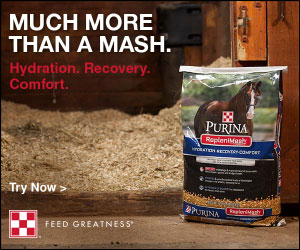The Lack Of Science In My Supplements

By Laura Reiman
A few years ago, I paid an obscene amount of money for a consult with an equine nutritionist. I had recently graduated with a master’s degree in human nutrition myself, so gut health was at the forefront of my mind while struggling to control the EPM, chronic ulcers and general inflammation in my new horse. A trainer I respect had used this nutritionist, and she helped that trainer identify that her horse was allergic to hay, revolutionizing her life. I hoped for the same.
Prior to the consult, the nutritionist recommended that I get a complete blood count and chemical analysis of my horse’s liver enzymes, kidney function, fibrinogen and selenium levels. She also asked for a brief history and list of current supplements. Up to that point, I had cobbled a program of supplements together based off a combination of veterinarian recommendations and word-of-mouth.
One of the first things they teach you in grad school for nutrition is how to wade through articles and “research” with a critical eye. Nutrition is considered a young science, meaning there is still a lot to learn and new things are being found and/or debunked every day. I will admit, however, that rather than looking at supplement research and peer-reviewed data on what to add to my horse’s diet, I typically head straight to the forums. I rely more heavily on anecdotal evidence than the science. Especially since the “science” is typically bankrolled by the company making the supplement.
At the time of the consult, I was giving my horse Purina Ultium feed, Smartpak Immune, ProBios (I had already tried Succeed, aloe vera juice, EquiShure, Equiotic, and U-Gard at various points), UltraCruz natural vitamin E at an increased dosage, Elevate SE and Purina Outlast.
The nutritionist talked me through the supplements, pointing out that my horse’s grain listed soybean as a primary ingredient, something she considered inflammatory. In her opinion, this meant that every supplement I used was trying to correct an issue being propagated by his main food source. Unfortunately, providing my own grain didn’t seem realistic at the time.
Her other main concern was access to forage 24/7, so I bought a Porta-grazer. This has turned out to be one of the best purchases I’ve made for my horse because it is a ground slow feeder, meaning it allows for a natural position of the horse’s head and neck while ensuring the horse has access to hay for longer.
The nutritionist also pointed out the lack of research on how horses digest probiotics and vitamin E. I had switched to ProBios because several barn friends were using the product, but she thought that the company was really good at marketing, but was actually one of the weaker products on the market – Probios claims to have 10 million CFUs (colony forming units) per serving. She recommended a preservative-free product with 100 billion CFU. That cost $96 per month. She liked a few of the products I was using, but also thought my horse could benefit from flax, hemp, colostrum (at $77 per month), a different immune system supplement (a whopping $130 per month) and a microbiome supplement (just a measly $60 per month). While some people are certain horses can only digest vitamin E as a liquid, she thought natural powder was ok.
I was overwhelmed. I decided to give a few of the more expensive options a try for a few months, but was not convinced they were worth the price tag. It’s worth noting that my own doctor has recommended several supplements for me including vitamin D, all of which I have ignored. When I wear my nutritionist cap, I tell people that with a balanced diet, they don’t need supplements and that the supplement market is saturated with false claims, not enough research, and the potential for more harm than good. But this is a do as I say, not as I do mentality. For my horse, I am always desperate to find the magic solution to all problems.
Colostrum, which was supposed to heal my horse’s gut the most, was a quick no. My horse is not a picky eater, but absolutely refused the addition to his diet. I decided after a few months that the probiotic, with its questionable efficacy and extreme price, was also a no. The immune support was also short lived. I felt silly giving my horse something mushroom-based and the color of baby poo. The flax and hemp lasted for several years, but I’ve nixed them as well in an effort to consolidate supplements and costs. I also cut the Elevate SE, since Selenium is one of the few supplements we know of that can actually become toxic if overfed.
The one major takeaway I’ve had has been to track my horse’s bloodwork on a regular basis. A complete blood panel paints a good picture of your horse’s health and whether they are getting adequate nutrition or not. You don’t need a nutritionist to translate the numbers, it’s relatively easy to understand yourself.
Ironically, after years of effort, my horse has finally put on a sufficient amount of weight and has scoped clear for ulcers. Turns out all he needed was higher quality hay, better fields, and generally happy home life. He went from 8lbs of grain to 2lbs of a senior feed. After all that money spent and information gathered, I still sit down every week and make little baggies filled with Purina Outlast, minerals, Vitamin E, Uckele GUT and Cosequin ASU (I actually swear by this product, it’s the only joint supplement that has stopped my horse’s joints from clicking). And every week, I ask myself which supplement I might be able to part with. Then, I tell myself that my horse is perpetually in a delicate balance of health and one little thing might tip the scales, so I continue to bag my powders and potions. It makes me feel better.


